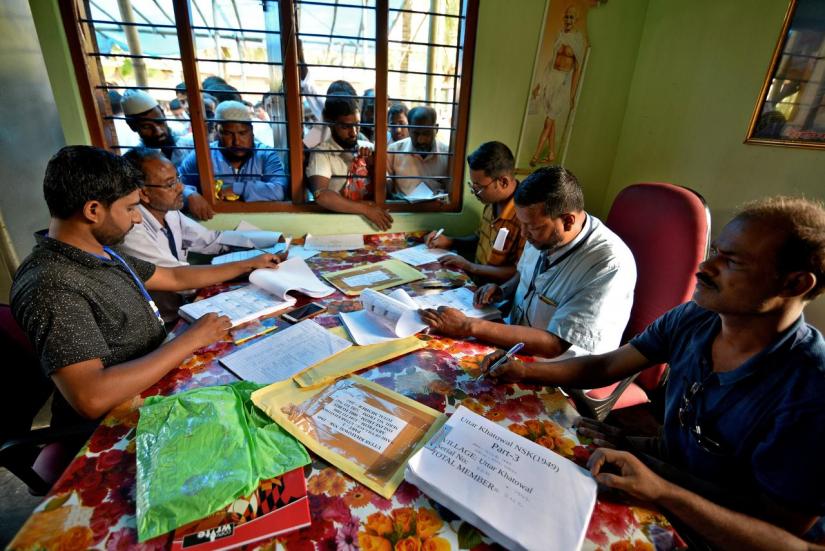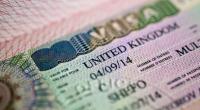 It has just been confirmed in India that the final draft of National Register of Citizens (NRC) in Assam, whenever published, will contain the names of suspected illegal immigrants from Bangladesh. Also, names of many ‘genuine Indian citizens’ may find no place in the draft, which is nearing completion. It has been checked once following massive public complaints and is currently being re-checked (in selective samples) to eliminate lingering errors, if any.
It has just been confirmed in India that the final draft of National Register of Citizens (NRC) in Assam, whenever published, will contain the names of suspected illegal immigrants from Bangladesh. Also, names of many ‘genuine Indian citizens’ may find no place in the draft, which is nearing completion. It has been checked once following massive public complaints and is currently being re-checked (in selective samples) to eliminate lingering errors, if any.
The NRC updating in Assam, as part of the Assam accord 1985 and ordered by the Supreme Court (SC), has been a massive enterprise, involving back breaking labour on part of over 6,000 mostly state government officials for over 36 months yet, by an unexpected tweak of fate, it seems the target of preparing an accurate list of Indian citizens in Assam will remain an elusive goal, as before. Before analysing the factors that have led to this position, it is better to begin by dealing with the significance of the latest announcement made by the SC.
The SC has announced that the final draft of Indian citizens in Assam must be ready for publication by Aug 2019. This means the court has allowed the NRC authorities an additional month to complete their work, the earlier deadline being Jul 31. This order follows a surprising joint plea put up by the Assam and Central Government authorities, seeking a longer extension of the timeline.
Their reasons for approaching the SC make interesting reading. Counsel representing Assam Tushar Mehta and the Solicitor General of India Venugopal, with barely a few days left for the Jul 31 deadline, and dramatically announced that the NRC list prepared so far was not error-free.
They reported that names of many non-citizens (read illegal immigrants) had been included especially from the Barak valley districts in Assam, bordering Bangladesh. The converse, the wrongful omission of genuine Indian citizens, was also true. Many had been left out who should have been included. It was suspected such errors occurred because, especially at lower levels of the enumeration and checking etc, some official staff were bribed!
In their view, more time should be allowed to complete the NRC’s work. During this time, the data recorded about the residents of the Barak Valley districts bordering Bangladesh should be re-checked on a major scale--- details of at least 20% of the people registered in these areas should be thoroughly monitored.
The SC rejected the demand. The NRC’s Assam-based Chief Pratik Hajela had earlier reported that to offset further criticism about what the critics of the NRC exercise described as 'slipshod ways' of the enumeration process, there had already been a thorough rechecking of data for over 700,000 people. About 100,000 names had been deleted, to be added to those deleted earlier. The process was still on. Out of an aggregate population of around 320 million in Assam, the process of rechecking would thus cover a significant part, by any reckoning.
Referring to this, Chief justice Ranjan Gogoi felt a further 20% sample checking as proposed by Assam and Delhi authorities could be dispensed with. However, to help make the final draft more accurate, he partially met the official request for more time by ordering a one month extension.
It needs restating that currently about 4.1 million people in Assam, comprising Bengali speaking Hindus and Muslims of Bangladeshi origin, have been left out as non citizens by the NRC authorities. Of them about 3.6 million have reapplied for citizenship. As of now, there are no reliable estimates as to how many of the people making fresh applications would make to the final list of citizens.
This adds to local tensions prevailing in the districts where Muslim and Hindu Bangalis live in large numbers. Distrust increases between Assamiyas and Bengali speakers, the latter also alleging harassment and discrimination from the police. These include, apart from the three Barak Valley districts, Dhubri, Goalpara, Kamrup, Nagaon, Bongaigaon and Nalbari, to name only a few. Officially anyone arriving after Mar 24 1971, the cut off date announced in the 1985 Assam Accord without valid documents is deemed a ‘foreigner’. So far, at least 51 persons have committed suicide when they did not find their names in the first list of citizens published some months ago. No compensation has been announced either by the state or the centre for the families of those affected- mostly very poor people.
So far nearly 30,000 people had been repatriated to Bangladesh up to September 2018, according to Assam’s Minister for industries, Chandra Mohan Patowary. Their cases were handled by the Foreigners’ Tribunals, to which details had been referred about 91,000 people of dubious identity. At present 1,037 people including 31 children were lodged in six or seven special detention centres in Assam, some of them for a number of years.
Since the authorities provided mainly food and shelter for those in detention but not much else, domestic and international civil rights groups and spokesmen have criticized the state officials strongly for depriving the detenus of their minimum rights by international law recognised.
There is no talk at any level of sending large numbers of disenfranchised, stateless people to Bangladesh from Assam. Theoretically as stated before in these columns, their plight could well be akin to the Rohingyas of the Rakhine province in Myanmar- a group of people the world does not seem to want!
Observers are worried that since the final list of citizens published on Aug 31 will inevitably contain, on official admission, names of ‘foreigners’ who allegedly bribed their way into India and leave some genuine citizens in the lurch, no major ethnic group in Assam would be satisfied. Certainly not the All Assam Students’ Union (AASU) the enthusiastic champions of the NRC exercise, nor the body opposing them, the All Assam Minority Students’ Union (AAMSU). Both sides will have much to complain of, on present evidence. The ball will be then in the centre’s court for a final decision on the citizenship issue.
 International
International
40283 hour(s) 45 minute(s) ago ;
Morning 06:39 ; Thursday ; May 22, 2025
Assam’s NRC exercise: A devil’s brew
Send
Ashis Biswas, Kolkata
Published : 04:00, Jul 26, 2019 | Updated : 04:00, Jul 26, 2019
Published : 04:00, Jul 26, 2019 | Updated : 04:00, Jul 26, 2019
0 ...0 ...
/pdn/
Topics: Top Stories
- KOICA donates medical supplies to BSMMU
- 5 more flights to take back British nationals to London
- Covid19: Rajarbagh, Mohammadpur worst affected
- Momen joins UN solidarity song over COVID-19 combat
- Covid-19: OIC to hold special meeting
- WFP begins food distribution in Cox’s Bazar
- WFP begins food distribution in Cox’s Bazar
- 290 return home to Australia
- Third charter flight for US citizens to return home
- Dhaka proposes to postpone D8 Summit
Unauthorized use of news, image, information, etc published by Bangla Tribune is punishable by copyright law. Appropriate legal steps will be taken by the management against any person or body that infringes those laws.
Bangla Tribune is one of the most revered online newspapers in Bangladesh, due to its reputation of neutral coverage and incisive analysis.
F R Tower, 8/C Panthapath, Shukrabad, Dhaka-1207 | Phone: 58151324; 58151326, Fax: 58151329 | Mob: 01730794527, 01730794528


